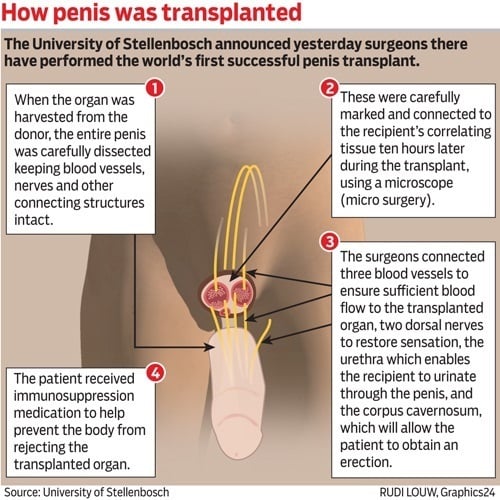
The first penis transplants in the U.S. will soon help heal wounded veterans
Johns Hopkins University will soon perform the first penis transplants in the United States — and wounded soldiers will be the first patients. The New York Times reports that the first surgery could occur in just a few months.
News of penis transplants might send the uninformed into fits of giggles, but the procedure — which has been successfully completed in South Africa — is serious business. In South Africa, the procedure is being perfected with an eye toward helping men injured during ritual circumcisions, which are common in the Xhosa tribe.
In the United States, circumcision after infancy (and the injuries that often come with it) is admittedly less common. But that doesn't mean there isn't a need for penis transplants: The Department of Defense Trauma Registry reports that 1,367 military servicemen sustained injuries to the genitals between 2011 and 2013 in Iraq and Afghanistan alone.
It's true that one doesn't require a penis to live a long and productive life. But because male genitals are so strongly associated with a sense of masculinity and identity in our culture, the sudden loss can be debilitating. Reconstruction using skin from other parts of the body or prosthetics can help, but it doesn't restore natural function. Only a complete organ taken from a deceased donor — and attached in a highly experimental surgery — can do that.
“Our young male patients would rather lose both legs and an arm than have a urogenital injury,” Scott E. Skiles, the polytrauma social work supervisor at the Veterans Affairs Palo Alto Health Care System, told the Times.
The procedure itself is no easy feat, with Johns Hopkins doctors estimating a 12-hour surgical marathon. And the stakes are high. From an earlier Speaking of Science post on the subject:
It's no small thing to reattach any organ, and sexual organs have added psychological implications. If the function (both urinary and sexual) and appearance aren't just right, the recipient has to deal with the implications of having a troublesome foreign object where his penis should be.Even if everything is working physically, the psychological trauma can sometimes be too much to bear. That's what happened to the Chinese patient who could have been the first successful recipient: In 2006, 10 days after a physically successful surgery, the manasked doctors to remove his new organ.
One day scientists may be able to grow new organs for these patients in the lab, using their own site-specific stem cells. Until then, the potential psychological implications of waking up with a stranger's genitals are a major concern — so it's important that these injured vets go in with realistic expectations. But in the one case that's worked, the results have been tremendous: In June, South African surgeons reported that their patient had impregnated his girlfriend just six months after his experimental transplant.
Read More:
No comments:
Post a Comment